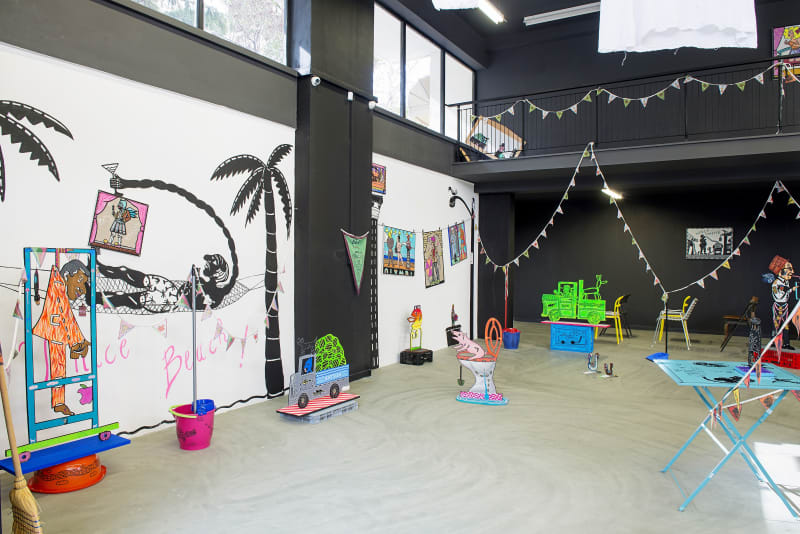Spyros Aggelopoulos exhibits his dirty laundry to present every antihero’s secret power: The attack on the smile-less.
The second solo show by artist Spyros Aggelopoulos with Dio Horia gallery opens its doors in Athens on 19th of March. The exhibition titled Δε Laundry Basket [The Laundry Basket], includes new paintings, sculptural installations and an experimental silent movie that as a whole construct the artist’s universe as a trooper.
The Δε Laundry Basket exhibition, resembles a freak show modeled after a carnivalesque fête d’hiver. The exhibition represents a ritualistic carnival festivity, featuring celebrities, midgets, various monsters, talking animals and a host of other creatures, figments of imagination that make up a spectacular motley world amidst laughs and curses and outrageous rebukes and insults. Aggelopoulos’s intention is to highlight the misshapen, the paradoxical and the exaggerated; the grotesque. That which is disturbing to the eye, precisely because, as a “monster”, it encapsulates all “possible micro-anomalies” that unfold through the games nature plays.
In all his artistic practice, Aggelopoulos is resorting to laughter, or rather to the desire for laughter. In all its destructive and at the same time regenerative power, puts up his own freak show in an attempt to activate its satirical acuity and liberating energy. Aggelopoulos therefore, creates an artistic freak show, through which we can salvage the sort of laughter that functions subversively. The sort of laughter that preserves the memory of the carnival, the country fair, the folk whimsy, the Karagiozis puppeteer, the traveling actors and musicians, the hawkers and peddlers, the town square, the sorcerer, the fortune teller, and all things folk culture.
Aggelopoulos is drawn by the archetype of the traveling artist, an equivalent of which he identifies in Tom Waits’s roles of compulsive characters on the margins of society. The divergence from the Western model of the “ideal”, the flaw, the different perception of things, create “beautiful losers”, modern-day freakish characters, who are blended together with public figures in Aggelopoulos’s play: Whoever can handle his weakness ends up with all the power and, in this way, stakes his claim to be pronounced a superhero of our time. Aggelopoulos speaks of characters and situations each and every one of us can recognize. And at the same time, he speaks with an inner part of us. These are the components that make up the super-universe he is presenting at Dio Horia Gallery.
Starring in Δε Laundry Basket’s iconography is a table, the Head in a jar, evoking references to old freak shows that invited people to see the head of Joaquin Murrieta or Emiliano Zapata. Out and about are Batman driving a truck filled with watermelons; Wonder Woman; Pacwoman; the children’s series heroine Candy Candy, only without legs and titled Half a Candy is still a Candy exhibited next to an open-air laundry, various mops and painted buckets.
Aggelopoulos blends reality with imagination. He brings together a wide range of techniques and practices of differentiation and deviation, paying attention to construction, repair and ad hoc solutions, adding theatrical scenery to his toolbox. Life and its contradictions become a stage. And vice versa – the stage featuring all these forms of otherness and strangeness becomes life. It is life. It is the method employed by John Cassavetes to make independent cinema – one that fascinates Aggelopoulos. The myth of the director who shunned Hollywood filmmaking is fueling his own ideas about creativity. Just like Cassavetes captured snapshots of life on the streets of New York, Aggelopoulos treats his work as a film without a script, based on the improvisation of actors and the realism of everyday people.
In the end, Spyros Aggelopoulos brings together the forms of his heroes, presenting Δε Laundry Basket with one objective: “To be theatrical without a résumé.” He wants his viewers, the visitors of the exhibition, to see it and embrace their own vulnerability. And think to themselves: “Starting tomorrow, I too will be in there, I will be part of what I see.”
